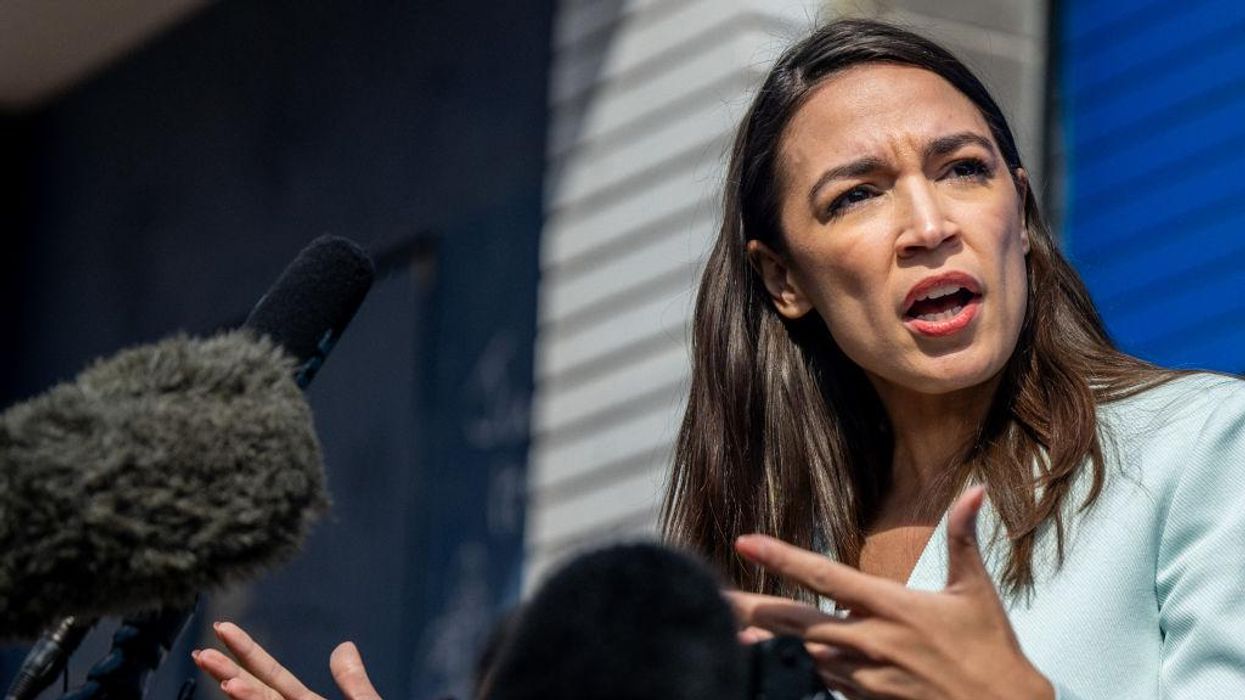
Brandon Bell/Getty Images

Progressive Democrats are accusing oil companies of "profiteering" and are demanding they face "consequences" for high prices at the pump as the price of crude oil fell below $100 on Monday and continued to decline Tuesday. But the industry has fired back, saying these Democrats are "grandstanding" instead of proposing solutions to the gas crisis.
Rep. Alexandria Ocasio-Cortez (D-N.Y.) on Monday responded to MSNBC host Stephanie Ruhle, who asked "what's going on" with gas prices averaging $4.32 per gallon on Monday while the price of crude oil dropped 8% and fell below $100 per barrel. "Profiteering. And there should be consequences for it," the congresswoman replied.
Profiteering. And there should be consequences for it.https://twitter.com/sruhle/status/1503397084837429253\u00a0\u2026— Alexandria Ocasio-Cortez (@Alexandria Ocasio-Cortez) 1647286241
Fellow "squad" member Rep. Ilhan Omar (D-Minn.) echoed her comments, writing, "Big oil CEOs need to be held accountable for profiteering, this can’t stand."
And another congressman, Rep. Mondaire Jones (D-N.Y.), accused oil companies of "price-gouging" and said, "Congress must pass legislation to stop it."
Their comments drew a harsh rebuke from the American Petroleum Institute, which said, "The American people are looking for solutions, not finger pointing."
"The price at the pump that Americans are currently paying is a function of increased demand and lagging supply combined with the geopolitical turmoil resulting from Russia’s aggression in Ukraine," API Senior Vice President of Policy, Economics, and Regulatory Affairs Frank Macchiarola explained in a statement to TheBlaze.
"Lawmakers should focus on policies that increase US supply to help mitigate the situation rather than political grandstanding that does nothing but discourage investment at a time when it’s needed the most,” Macchiarola said.
Left-wing accusations of price gouging came after the West Texas Intermediate crude, the U.S. benchmark for crude oil, traded at $94.15 per barrel on Monday, coming down from the high of $130 reached a little more than a week ago. Crude oil prices remained below $100 a barrel on Tuesday as well.
Industry analysts said the previous spike in oil prices was fear-based, driven by concerns over how Russia's energy exports would be impacted by import bans from the U.S. and Canada, CNBC reported. The decline in prices is related to hopes that the commodity market will be resilient, as well as expectations that renewed COVID-19 lockdowns in China will prevent millions of people there from traveling and reduce demand for gasoline.
What that means is that in the short-term, gas prices could begin to decline, but a change in prices may come slowly. Crude oil makes up about 56% of the price of regular gasoline, according to the U.S. Energy Information Administration. Falling crude oil prices will "take a lot of the pressure off pump prices," but this change will be a "gradual decline," American Automobile Association's Andrew Gross told Newsweek Tuesday.
Claims that oil companies haven't responded to the market are inaccurate. Patrick De Haan, an analyst for GasBuddy, observed Monday that there has in been a "slow decline" in gas prices, noting that the national average price of gas has decreased four cents per gallon since Thursday.
Seeing a slow decline. Stations lost their shirts on the way up, so the drop will be slow- but has already started. National average down 4c/gal since Thursday.https://twitter.com/sruhle/status/1503397084837429253\u00a0\u2026— Patrick De Haan \u26fd\ufe0f\ud83d\udcca (@Patrick De Haan \u26fd\ufe0f\ud83d\udcca) 1647279493
Some experts have cautioned that the drop in prices may be temporary. Tom Kloza, global head of energy analysis at the Oil Price Information Analysis, told CNN that if crude oil stays around $100 per barrel, fuel prices could drop by about 20 cents per gallon. But he warned that prices could spike again in the spring and summer as people begin traveling more, increasing demand for gasoline. The World Travel & Tourism Council predicts a 6.2% increase over pre-pandemic travel levels within the U.S. this year, which the organization says will add nearly $2 trillion to U.S. GDP, CNN reported.
Kloza said he expects all of that additional travel to bring gas prices up to about $4.50 per gallon. But that figure will be a result of increased demand for a product that's restricted by supply, not greedy corporations taking advantage of consumers.
Gas prices have reached record highs since the Russian invasion of Ukraine began on Feb. 24, prompting international sanctions against Russia and disrupting oil markets. However, the cost to fill up a vehicle was increasing well before the invasion began, and this is not the first time Democrats have blamed oil companies.
In November, when the average price of gas was $3.22 — at the time the highest level since 2014 — President Joe Biden sent a letter to the Federal Trade Commission tying rising prices to alleged "anti-consumer behavior" from oil companies. The industry blasted the accusation, arguing rising prices were the result of complicated factors including the COVID-19 pandemic, supply chain disruptions, and increased demand for gas. The American Petroleum Institute called Biden's letter a "distraction" and said that "ill-advised government decisions" were "exacerbating this challenging decision."